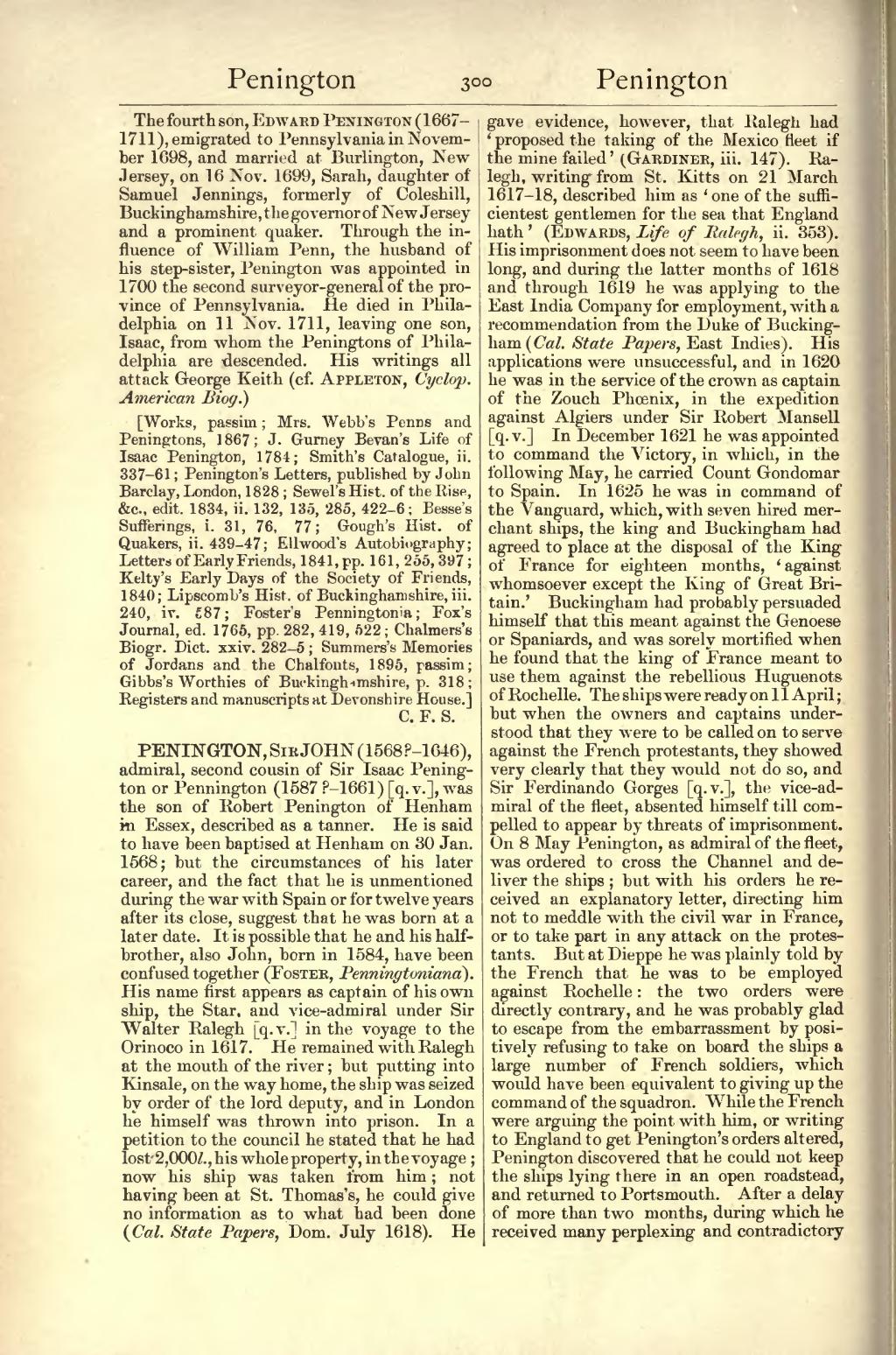The fourth son, Edward Penington (1667–1711), emigrated to Pennsylvania in November 1698, and married at Burlington, New Jersey, on 16 Nov. 1699, Sarah, daughter of Samuel Jennings, formerly of Coleshill, Buckinghamshire, the governor of New Jersey and a prominent quaker. Through the influence of William Penn, the husband of his step-sister, Penington was appointed in 1700 the second surveyor-general of the province of Pennsylvania. He died in Philadelphia on 11 Nov. 1711, leaving one son, Isaac, from whom the Peningtons of Philadelphia are descended. His writings all attack George Keith (cf. Appleton, Cyclop. American Biog.)
[Works, passim; Mrs. Webb's Penns and Peningtons, 1867; J. Gurney Bevan's Life of Isaac Penington, 1784; Smith's Catalogue, ii. 337–61; Penington's Letters, published by John Barclay, London, 1828; Sewel's Hist. of the Rise, &c., edit. 1834, ii. 132, 135, 285, 422–6; Besse's Sufferings, i. 31, 76, 77; Gough's Hist. of Quakers, ii. 439–47; Ellwood's Autobiography; Letters of Early Friends, 1841, pp. 161, 255, 397; Kelty's Early Days of the Society of Friends, 1840; Lipscomb's Hist. of Buckinghamshire, iii. 240, iv. 587; Foster's Penningtonia; Fox's Journal, ed. 1765, pp. 282, 419, 522; Chalmers's Biogr. Dict. xxiv. 282–5; Summers's Memories of Jordans and the Chalfonts, 1895, passim; Gibbs's Worthies of Buckinghamshire, p. 318; Registers and manuscripts at Devonshire House.]
PENINGTON, Sir JOHN (1568?–1646), admiral, second cousin of Sir Isaac Penington or Pennington (1587?–1661) [q. v.], was the son of Robert Penington of Henham in Essex, described as a tanner. He is said to have been baptised at Henham on 30 Jan. 1568; but the circumstances of his later career, and the fact that he is unmentioned during the war with Spain or for twelve years after its close, suggest that he was born at a later date. It is possible that he and his half-brother, also John, born in 1584, have been confused together (Foster, Penningtoniana). His name first appears as captain of his own ship, the Star, and vice-admiral under Sir Walter Ralegh [q. v.] in the voyage to the Orinoco in 1617. He remained with Ralegh at the mouth of the river; but putting into Kinsale, on the way home, the ship was seized by order of the lord deputy, and in London he himself was thrown into prison. In a petition to the council he stated that he had lost 2,000l., his whole property, in the voyage; now his ship was taken from him; not having been at St. Thomas's, he could give no information as to what had been done (Cal. State Papers, Dom. July 1618). He gave evidence, however, that Ralegh had ‘proposed the taking of the Mexico fleet if the mine failed’ (Gardiner, iii. 147). Ralegh, writing from St. Kitts on 21 March 1617–18, described him as ‘one of the sufficientest gentlemen for the sea that England hath’ (Edwards, Life of Ralegh, ii. 353). His imprisonment does not seem to have been long, and during the latter months of 1618 and through 1619 he was applying to the East India Company for employment, with a recommendation from the Duke of Buckingham (Cal. State Papers, East Indies). His applications were unsuccessful, and in 1620 he was in the service of the crown as captain of the Zouch Phœnix, in the expedition against Algiers under Sir Robert Mansell [q. v.] In December 1621 he was appointed to command the Victory, in which, in the following May, he carried Count Gondomar to Spain. In 1625 he was in command of the Vanguard, which, with seven hired merchant ships, the king and Buckingham had agreed to place at the disposal of the King of France for eighteen months, ‘against whomsoever except the King of Great Britain.’ Buckingham had probably persuaded himself that this meant against the Genoese or Spaniards, and was sorely mortified when he found that the king of France meant to use them against the rebellious Huguenots of Rochelle. The ships were ready on 11 April; but when the owners and captains understood that they were to be called on to serve against the French protestants, they showed very clearly that they would not do so, and Sir Ferdinando Gorges [q. v.], the vice-admiral of the fleet, absented himself till compelled to appear by threats of imprisonment. On 8 May Penington, as admiral of the fleet, was ordered to cross the Channel and deliver the ships; but with his orders he received an explanatory letter, directing him not to meddle with the civil war in France, or to take part in any attack on the protestants. But at Dieppe he was plainly told by the French that he was to be employed against Rochelle: the two orders were directly contrary, and he was probably glad to escape from the embarrassment by positively refusing to take on board the ships a large number of French soldiers, which would have been equivalent to giving up the command of the squadron. While the French were arguing the point with him, or writing to England to get Penington's orders altered, Penington discovered that he could not keep the ships lying there in an open roadstead, and returned to Portsmouth. After a delay of more than two months, during which he received many perplexing and contradictory
